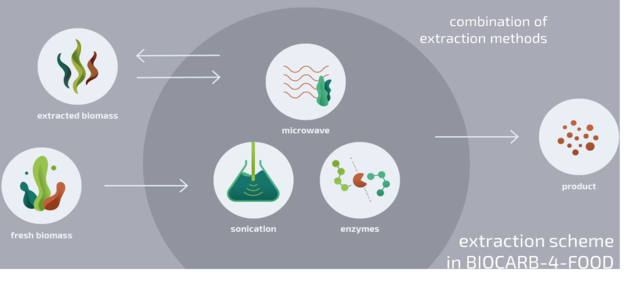BIOCARB-4-FOOD
Improving inefficient industrial processes for carbohydrate extraction from marine algae through new extraction methods and use of remaining biomass
BACKGROUND Carbohydrates are the most important source of energy from food and its main component. They serve as thickeners, gelling agents, stabilizers, or have other functional properties. Cell wall polysaccharides and bioactive polyphenols or carotenoids are obtained from algae and seaweeds, but these sources are not exhausted. Current extraction methods for their production are inefficient. Usually >50% of the remaining carbohydrate-rich biomass is disposed of as compost or organic waste.
IMPLEMENTATION In cooperation with the industrial sector, environmentally friendly, more efficient methods of extraction (ultrasound, microwaves, enzymes and their combinations) are being researched. The remaining biomass, which is still rich in bioactive compounds, is used for the sequential production of carbohydrates and fibers (nanocellulose). Different structures, properties, toxicity, and bioactivity of the fractions are characterized and a Life Cycle Assessment is performed.
EXPECTED RESULTS BIOCARB-4-FOOD aims to improve process efficiency in the development of ingredients from commercial marine algae and underused sources such as seaweeds. The more efficient use of raw materials should improve the competitiveness of algae companies, food companies, and non-food companies, that can then use extraction products as food additives or biodegradable packaging. The relief of coastal areas through the use of algae is also beneficial.

